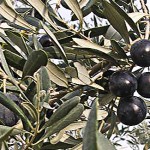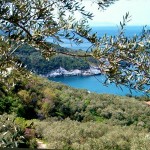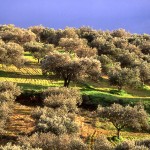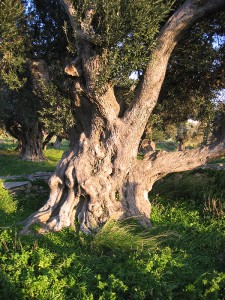If you deconstruct Greece, you’ll be left with an olive tree, a grapevine and a boat. With this much, you can reconstruct her” – Odysseas Elytis, Nobel Prize poet
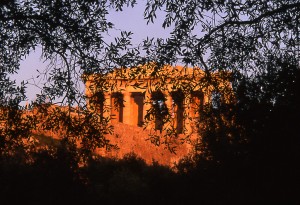 From North Africa, to the Middle East and across to Crete, the olive found its way to Greece, where it was widely cultivated. Known as “oleaeuropea”, its pollen has been found in Macedonia and fossilized leaves on the island of Santorini, dating back 37,000 years. This genus is an original element of the Greek flora.
From North Africa, to the Middle East and across to Crete, the olive found its way to Greece, where it was widely cultivated. Known as “oleaeuropea”, its pollen has been found in Macedonia and fossilized leaves on the island of Santorini, dating back 37,000 years. This genus is an original element of the Greek flora.
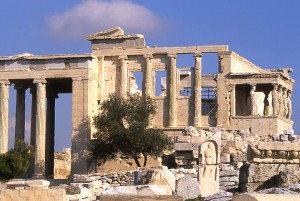 The mythology surrounding Athena’s victory over Poseidon over the naming rights of the ancient city-state of Athens came as a result of her gift, an olive tree. A small grove of olive trees is still flourishes on the Acropolis. Theophratus, the father of botany, wrote about this grove in the 4th Century BC. These trees could have originated in the Bronze Age. Indeed, olive trees can live for centuries,
The mythology surrounding Athena’s victory over Poseidon over the naming rights of the ancient city-state of Athens came as a result of her gift, an olive tree. A small grove of olive trees is still flourishes on the Acropolis. Theophratus, the father of botany, wrote about this grove in the 4th Century BC. These trees could have originated in the Bronze Age. Indeed, olive trees can live for centuries,
The Olive Tree was sacred and appeared on Athenian coins. It became a symbol of abundance, glory, wisdom, fertility, power, purity and peace and its branches made the wreath that crowned the winners of the ancient Olympic Games. This tradition was revived in the 1896 and 2004 Olympics held in Athens.
It is mentioned over 30 times in the Bible. It was an olive leaf the dove brought back to Noah to let him know the cataclysmic flood was over.

